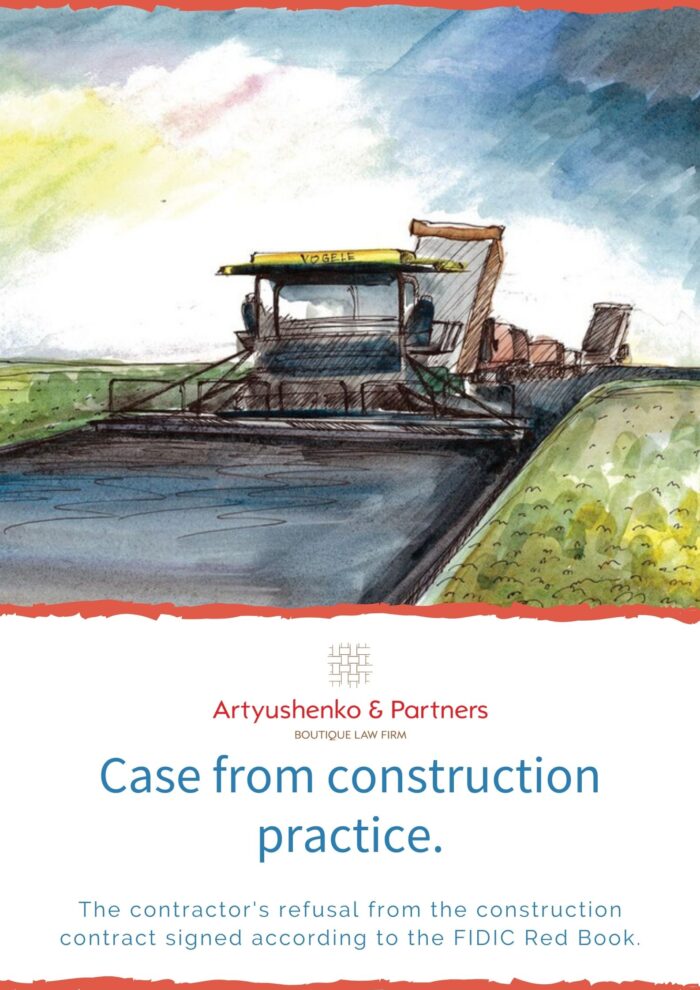
In September 2019, Company 1 (hereinafter referred to as the "Employer"), which is an entity of the quasi-public sector, and Company 2 (hereinafter referred to as the "Contractor") entered into a construction contract based on the FIDIC Red Book (hereinafter referred to as the "Contract"), financed by the European Bank Reconstruction and Development (hereinafter - the "EBRD"), according to which the Contractor undertakes to perform work for the Employer on the reconstruction of a section of the road, and the Employer to pay for them.
The contract was concluded based on the results of a tender held in accordance with the EBRD Rules. Applicable law - the law of the Republic of Kazakhstan.
The Employer notified GASK (State Architectural and Construction Control) about the start of construction and installation works (hereinafter - "CIW") and, according to the act, transferred the reconstructed section of the road to the Contractor for temporary maintenance for the period of CIW, and also transferred the Working Design.
In pursuance of the terms of the Contract, the Contractor provided the Employer to secure the performance of the Contract with an unconditional and irrevocable bank guarantee in the amount of X% of the Contract price (hereinafter referred to as the “Bank Guarantee for Enforcement of the Contract”). In addition, the Contractor had to provide the Employer with an unconditional and irrevocable bank guarantee for the return of the advance payment (hereinafter referred to as the “Bank Guarantee for the return of the AP”) within the period specified in the Contract (October 2019), and earlier than the payment of the Advance Payment by the Employer itself. Then this date was postponed by the Employer himself to a later date: until mid-February 2020.
Prior to that date, the Bank Guarantee for the return of the AP was not provided due to the fact that the Contractor determined that the execution of the Contract became impossible for him due to the risk of serious financial losses. And in order to resolve the issue of withdrawing from the Contract with the least losses for himself, given that the Bank guarantee was provided to ensure the execution of the Contract, the Contractor ProImobil (hereinafter - the "Client") appealed to our law firm for help.
Particularly, the Client was interested in:
• available options for terminating the Contract, in accordance with the terms of the Contract itself and the legislation of the Republic of Kazakhstan;
• the expected consequences when choosing one or another option, taking into account the existing judicial practice.
It should be noted that under the terms of the Contract, the resolution of any disputes arising within the terms of Contract is transferred to Arbitration, which is preceded by the obligatory passage of the pre-arbitration dispute settlement procedure by the Dispute Resolution Council for the Parties, which is quite costly and lengthy (took up to 168 days).
The lawyers of our firm proposed the most optimal option in the current situation for the Client to withdraw from the Contract by unilateral refusal to execute it (withdrawal from the contract).
According to clause 1 of Article 404 of the Civil Code of the Republic of Kazakhstan (hereinafter referred to as the "CC RK"), unilateral refusal to execute the contract (refusal of the contract) is allowed in the cases provided for by this Code, other legislative acts or by agreement of the parties.
In accordance with clause 3 of Article 401 of the CC RK, an agreement is considered amended or terminated in the case of a unilateral refusal to fulfill the agreement (refusal from the agreement, respectively, in part or in full (Article 404 of this Code).
Thus, the law (CC RK) allows the party of the contract to execute, if such a right is granted to the party by the agreement (contract). And in this case, the contract is considered terminated, that is, the party does not need to file a claim in court (arbitration) to obtain a decision on termination of the contract.
The contract, within the certain circumstances, provides for the unilateral refusal of the Contractor from the contract, that is, without applying to the Arbitration, and therefore without the need to comply with the complicated dispute settlement procedure preceding the Arbitration, which is allowed by virtue of the above legal norms.
Under the terms of the Contract, the Contractor needs to notify the Employer 14 days in advance to cancel the contract.
One of the grounds provided for by the Contract giving the Contractor the right to refuse to perform the contract was a significant breach by the Employer of its obligations under the Contract, which had a significant negative impact on the Contractor's ability to perform the Contract.
It was established that the Employer had committed such material breaches of contractual obligations.
In particular, not all permits noted by the Contract and necessary for the Commencement of work were handed over to the Contractor by the Employer.
Also, the Employer, in violation of the terms of the Contract and the requirements of the legislation, did not transfer to the Contractor permits for land plots for the implementation of CIW, moreover, he shifted the responsibility for obtaining permits for land plots to the Contractor.
Whereas, according to the legislation of the Republic of Kazakhstan, the obligation to provide the Contractor with all the necessary permits, which primarily include the rights to land plots, lies with the Employer.
So, according to Article 658 of the CC RK, the employer is obliged to provide a land plot for construction of such an area and in such a condition within timely period as specified in the contract. In the absence of such instructions in the contract, the area and condition of the land plot must ensure the timely commencement of work, their normal conduct and completion on time.
Clause 2 of Article 68 of the Law of the Republic of Kazakhstan dated July 16, 2001 No. 242-II "On architectural, urban planning and construction activities in the Republic of Kazakhstan" (hereinafter - the "Law") established that the employer intending to carry out the construction of the facility is obliged in accordance with the land legislation of the Republic of Kazakhstan, obtain from the local executive bodies of districts (cities) a decision on granting the corresponding right to land.
Subclause 2) of Clause 2 of Article 34-2 of the Law establishes that the Employer of construction is obliged to provide the facility with all the necessary permits provided for by the legislation of the Republic of Kazakhstan.
In accordance with subclause 15) clause 4 of the Rules for the organization of development and passage of licensing procedures in the field of construction, approved by order of the Minister of National Economy of the Republic of Kazakhstan No. 750 dated November 30, 2015, permits are documents giving the applicant the right to implement his plan for construction or alteration of premises (separate parts) of existing buildings, which include the decision of the local executive body to grant the corresponding right to land.
The lawyers found the appropriate court practice confirming this obligation of the Employer.
Thus, by law and the terms of the Contract, the obligation to provide the Contractor with all the necessary permits, which primarily include the rights to land plots, is assigned to the Employer. The Employer violated this obligation. The specified violation by the Employer of its obligations may be regarded as a significant violation that has a significant negative impact on the Contractor's ability to execute the Contract, since in the absence of a formalized right to use land plots required under the Contract, CIW cannot be started.
It was also set out that, according to the Working Design transferred to the Contractor by the Employer, a positive Conclusion of the State Expertise was received on September 14, 2016.
Since by February 2020 the CIW under the Contract had not been started due to the fault of the Employer, the Working Design in fact became obsolete, and therefore was subject to adjustment, re-examination and re-approval in accordance with the procedure established by the legislation of the Republic of Kazakhstan.
This conclusion follows from the norm of caluse 7 of Art. 60 of the Law, according to which the project (design and estimate) documentation, according to which construction has not started within three or more years after its approval in the procedure prescribed by the legislation of the Republic of Kazakhstan, is considered outdated (obsolete) and used for implementation after adjustment, re-examination and re-approval in the procedure prescribed by the legislation of the Republic of Kazakhstan.
Legislation obliges the Contractor to inform the Employer if the technical documentation is found to be unsuitable.
Particularly, in accordance with Article 628 of the CC RK, “the contractor is obliged to immediately warn the employer and, before receiving instructions from him, to suspend the work if it is found that the materials, equipment, technical documentation provided by the employer, or the thing transferred for processing are unsuitable or of poor quality (clause 1).
A contractor who did not notify the employer about the circumstances specified in clause 1 of this article, or who continued to work without waiting for the expiration of a reasonable time to respond to the warning or despite the employer's timely instruction to suspend the work, is not entitled upon presentation of the relevant requirements to him or to the employer refer to the specified circumstances (clause 2).
If the employer, despite a timely and justified warning from the contractor about the circumstances specified in paragraph 1 of this article, within a reasonable time does not replace the unusable or poor-quality material, does not change the instructions on the method of performing the work, or does not take other necessary measures to eliminate the circumstances threatening suitability or strength of work, the contractor has the right to withdraw from the contract and demand compensation for losses caused by its termination ”(clause 3).
Тhus, the Contractor is obliged, by virtue of the direct instruction of the law, to warn the Employer about the need to adjust the outdated Working Design, otherwise the Contractor will not be able to refer to this circumstance in the future. If the Employer fails to eliminate this violation within a reasonable time (correction, re-examination, re-approval of the Working Design), the Contractor has the right to withdraw from the Contract, as well as demand compensation for losses caused by the termination of the Contract.
Taking into account that the specified violation (unsuitability of the Working Design) cannot be eliminated within a reasonable time, since after the adjustment, re-examination and re-approval of the Working Design, a new tender will be required, the Client was informed that there is a chance for him to terminate the Contract by refusing to perform the contract for this reason.
Submission by the Employer to the Contractor of an obsolete (outdated) Working Design for the implementation, obviously, was a significant violation by the Employer of the obligations under the Contract. And this circumstance had a significant negative impact on the ability of the Contractor to fulfill the Contract.
Moreover, the Contractor was not obliged to use the obsolete Working Design under the threat of being brought to administrative responsibility in the event of CIW on it (Articles 314 and 316 of the Code of the Republic of Kazakhstan "On Administrative Offenses" dated 05.07.2014).
The Client also worried about the possible consequences when choosing the proposed option (by refusing to perform the contract) of terminating the Contract.
The Client was pointed out that the consequences of termination of the Contract are established by the norms of the Civil Code of the Republic of Kazakhstan and the terms of the Contract.
Article 403 of the CC RK contains the consequences of terminating the contract:
- upon termination of the agreement, the obligations of the parties terminate (clause 1);
- if the contract was terminated on the basis of a significant violation by one of the parties, the other party has the right to demand compensation for losses caused by the termination of the contract (clause 5).
Consequences of termination of the Contract, as established by the Contract itself, came along with the norms of clause 403 of the CC RK.
Thus, in accordance with the Contract, after the notice of termination of the Contract has entered into force (14 days have expired), the Employer is obliged to immediately return the Contract Performance Guarantee to the Contractor; indemnify for loss or damage, including lost profits, incurred by the Contractor as a result of termination of the Contract.
The Client did not raise the issue of compensation for his losses, but he was extremely interested in the prompt return of the Bank Guarantee for securing the execution of the Contract and eliminating the risk of the Employer applying for collection on this Bank Guarantee.
According to Clause 4 of Article 292 of the CC RK, the termination of the main obligation entails the termination of the obligation ensurings, unless otherwise provided by the legislative acts of the Republic of Kazakhstan.
Clause 1 of Article 336 of the CC RK, established that the guarantee terminates with the termination of the obligation secured by it, unless the agreement provides for other cases of termination of the guarantee.
As you can see, the terms of the Contract also provided for the termination of the guarantee with the termination of the contract ensuring by the Contractor.
That is, upon expiration of 14 days from the notification date of the Employer of Contract termination by the Contractor in accordance with the terms of the Contract, the Employer shall immediately return the Bank Guarantee to the Contractor.
The Client was instructed that in the case of his one-side refusal to execute the Contract, the risk of the Employer applying for recovery on the Bank Guarantee is possible: if the Employer does not recognize such termination of the Contract and appeals it to Arbitration.
The Client should be ready for this and after initiating the termination of the Contract, immediately give a written instruction to the bank not to execute the Bank Guarantee and ignore the Employer's possible requirements for the execution of the Bank Guarantee.
Based on the results of the recommendations given to the Client, the Client sent to the Employer the Notice of unilateral refusal to perform the Contract on the grounds that the Employer committed a significant violation of its obligations, which had a significant negative impact on the Contractor's ability to perform the Contract.
The Notice listed in detail the violations committed by the Employer, which are mentioned above, and noted that after 14 days from the date of the Notice to Employer, the Contract is considered terminated, the obligations under it terminated and the Employer is obliged to immediately return the Bank Guarantee to the Contractor.
In order to avoid the risk of possible counter-actions on the part of the Employer to return the Bank Guarantee, the Client was advised to give a written instruction to the bank not to execute the Bank Guarantee at the Employer's request.
Such a letter was sent to the bank by the Client. At the same time, the letter indicated that he (the Contractor) initiated the termination of the Contract and then, in the case of the Employer's disagreement and the threat from his side of foreclosure on the Bank Guarantee, the Contractor intends to make a claim in court for recognizing the Employer's action on the Bank Guarantee as unjustified.
However, the bank replied that by virtue of the law it is obliged to fulfill the request of the Employer (Lender) to levy execution on the Bank Guarantee immediately, the bank is entitled not to fulfill such a requirement only if there is an injunction.
And this answer is absolutely correct (even if unexpected, which will be discussed below), since it corresponds to the essence of an irrevocable and unconditional bank guarantee: the bank is obliged to immediately fulfill the obligation under the Bank guarantee at the first request of the Lender (Beneficiary), and the Debtor (Principal) does not has the right to prohibit the Lender from requiring the bank to execute the bank guarantee.
It should be noted that the relationship arising from a bank guarantee is exclusively binding between the Guarantor (Bank) and the Lender (Beneficiary). A guarantee is, by its nature, an agreement independent of the underlying contract on which it is based, so the guarantor is in no way associated with such a contract, despite the fact that it take place in the text of the guarantee.
Based on the Uniform Rules for First-Demand Guarantees 2010 Edition (International Chamber of Commerce publication No. 758), which are referenced in the Bank Performance Guarantee itself, a guarantee is by its nature an agreement, independent of the underlying contract or tender on which it is based, therefore, the guarantor is in no way bound by such a contract or tender, despite the fact that they are referred to in the text of the guarantee. The obligation of the guarantor is to pay the amount of money specified in the guarantee, upon submission of a written request to pay and other documents specified in the guarantee, which, by their external features, correspond to the conditions described in the guarantee.
So, a bank guarantee is therefore called unconditional, because no conditions are required for the guarantor to fulfill the Lender's claim. Moreover, even if the Debtor presents indisputable evidence of his fulfillment of the obligation secured by such a guarantee, the guarantor has no right to reject to fulfill the obligation under the guarantee with reference to the fact that the Debtor has not violated the obligation. That is why an unconditional bank guarantee is one of the most reliable types of collateral.
However, the high degree of dispositiveness of the legislation of Kazakhstan on regulating the fulfillment of the obligation under a bank guarantee reduces the effectiveness of applying a bank guarantee and leads to incorrect law practice in courts.
In particular, in second-tier banks of Kazakhstan, an absolutely wrong practice has developed when the Lender's claims on the execution of the Bank Guarantee by the banks are not fulfilled due to the presence of information (letters) from the Debtor that such a claim is illegal and that he has initiated a dispute in court. Moreover, there is a negative judicial practice, when the Debtor's claims to prohibit the Lender's actions to enforce the Bank Guarantee are accepted and considered by the courts on the merits. All this gave us, as lawyers who have repeatedly encountered such negative practice, reason to believe that the Client's letter will be taken into account by the bank and for execution. But in this case the bank, that issued the Bank Guarantee to ensure the execution of the Contract, acted in strict accordance with the law.
In such circumstances, the Client was advised to go to court with a claim to invalidate the results of the competition for contract work and to cancel the Contract concluded as a result of this competition. The Client filed such a claim in court at the location of the Employer.
The purpose of making such a claim was, first of all, to suppress possible actions on the part of the Employer to levy execution on the Bank Guarantee. Moreover, the Client was able to achieve this without going to Arbitration, since such a claim is subject to consideration in court due to the fact that the contestation of the results of the competition is not covered by the provisions of the Arbitration Contract. Moreover, such a dispute does not require a pre-trial settlement.
The legality of filing such a claim follows from the norm of Article 67 of the Law, according to which “the results (selection of the winner and other results) of the competition (tender) for contract work conducted in violation of the procedure and conditions established for this competition (tender) or not in accordance with the law, can be appealed by the participant (participants) in court (clause 1).
Recognition of the results of the competition (tender) invalid entails the cancellation of the contract concluded between the employer and the winner (winners), and the competition (tender) is declared invalid ”(clause 2).
In basis of such a claim, the plaintiff indicated that the tender was not held in accordance with the legislation of the Republic of Kazakhstan, namely, the tender documents did not comply with the legislation.
At the same time with the appealing to the court with the claim above, the Client submitted an application to the court, as a measure of securing the claim, to prohibit the bank from fulfilling the Employer’s claim to levy on the Bank Guarantee, since failure to take such a measure may make it impossible to execute the court decision. The application to the court of such a measure will ensure the suppression of the actions of the Employer aimed at recovering the amounts under the Bank Guarantee before the case is considered on the merits and the court makes a decision.
The court satisfied this application: it issued a ruling on the application as a measure of securing the claim, the prohibition for the bank to fulfill the written request of the Employer to levy execution on the Bank Guarantee. This determination was sent to the bank for disposal. As a result, it was possible to avoid the risk of the Client losing a large amount in the form of a Bank Guarantee before the dispute between the parties to the Contract is resolved.
In conclusion, it should be noted that the Employer, realizing the futility of the requirement from the Contractor to execute the Contract, as well as the impossibility of enforcing the Bank Guarantee without trial, went to an out-of-court procedure for resolving the dispute.
As a result of the negotiations, with some mutual concessions, the Contract was terminated by agreement of the parties, the obligations under the Contract were terminated, the Bank Guarantee was returned to the Client. The client's claim was withdrawn from the court.
Lawyers agree that effective client representation requires careful planning, considering tactical alternatives. Moreover, the lawyer must be ready to change the action plan and to revise tactics at any time during the representation of the client's interests. These are challenging tasks. With proper planning, the strengths and weaknesses of the client's position and those of opponents are identified.
Summarizing the above, it should be pointed out that according to this case, the lawyers correctly built the tactics of action, which ultimately ended with a successful solution of the task. The most optimal option for the Client's withdrawal from the contract with the least financial losses, without damage to business reputation, without lengthy and expensive proceedings in Arbitration or in court was found and implemented.
Ospanova G.T.
Partner of Artyushenko and partners law firm
September 2020







